11+ Sample Website Advertising Agreement
-

Website Advertising Agreement Template
download now -
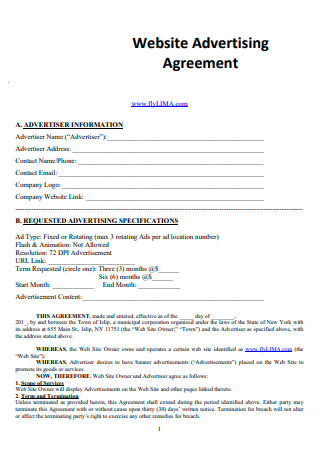
Basic Website Advertising Agreement
download now -
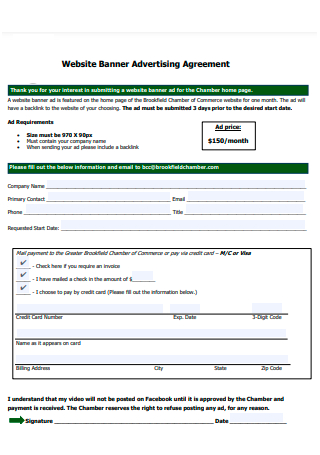
Website Banner Advertising Agreement
download now -
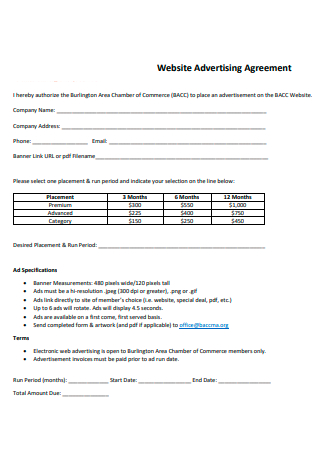
Website Advertising Agreement Example
download now -
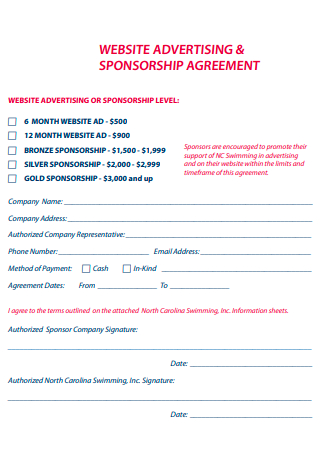
Website Advertising and Sponsorship Agreement
download now -
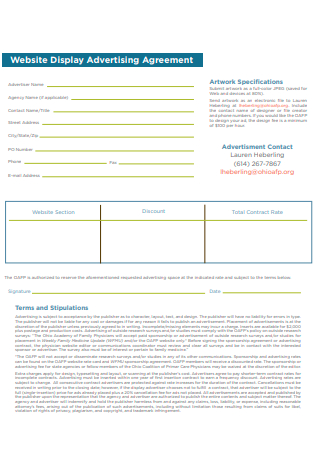
Website Display Advertising Agreement
download now -
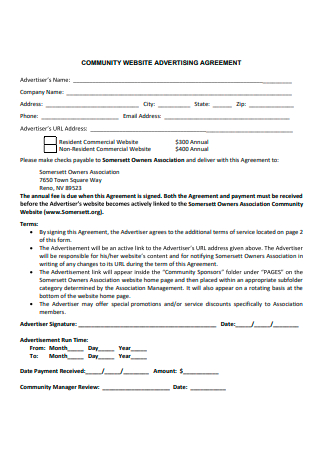
Community Website Advertising Agreement
download now -
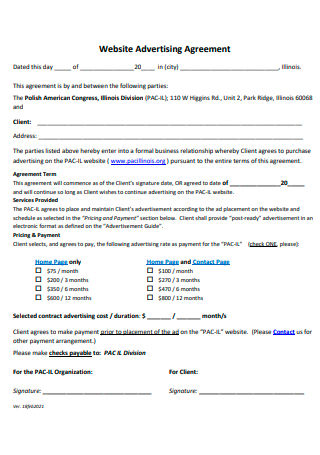
Sample Website Advertising Agreement
download now -
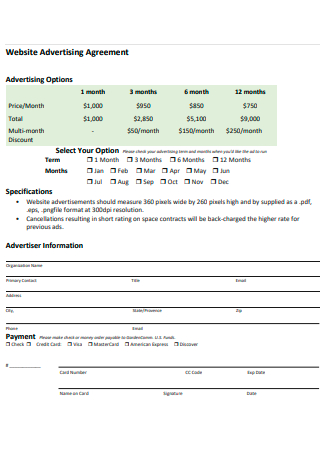
Printable Website Advertising Agreement
download now -
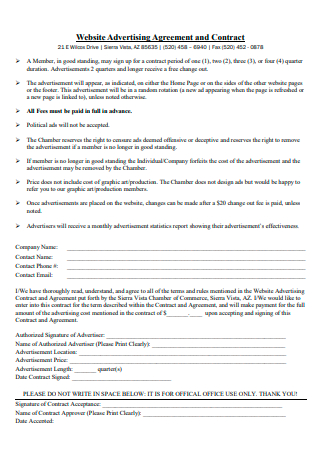
Website Advertising Agreement and Contract
download now -
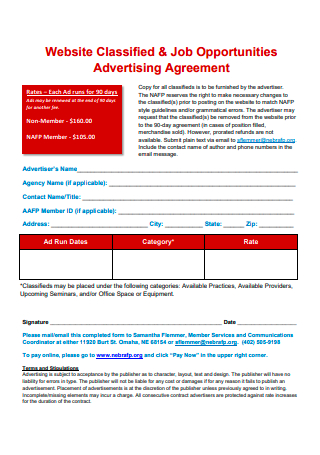
Website Classified and Job Opportunities Advertising Agreement
download now -
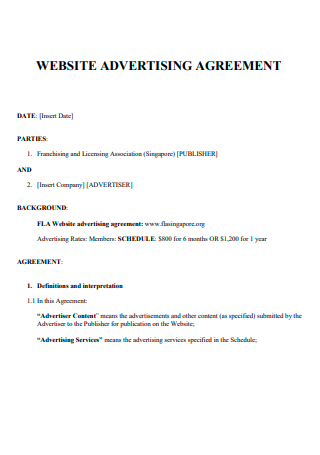
Simple Website Advertising Agreement
download now
FREE Website Advertising Agreement s to Download
11+ Sample Website Advertising Agreement
What Is a Website Advertising Agreement?
How to Write a Website Advertising Agreement
Different Types of Websites
Different Types of Advertising Agencies
FAQs
Why is it important to advertise through websites?
What are the two types of advertisements?
What is an advertising contract?
What Is a Website Advertising Agreement?
A Website advertising agreement is a contract between a website operator and an advertiser that wants to buy ad space on the website. The terms of a website advertising agreement specify how and when advertising space on a website can be acquired, as well as the cost of doing so. An advertising space contract template is made available for your use along with a digital advertising contract template. Making use of a template will provide you with ease in the layout and not have you worry over the details and format. That way, you are able to focus on other responsibilities and tasks.
How to Write a Website Advertising Agreement
Miscommunication, bad ad placement, inaccurate run dates, and the number of other issues might reduce or eliminate the impact of your ad if your website advertising agreement does not provide explicit specifics about how an ad can run. A good advertising service agreement will have a number of if-then clauses that will assist you to achieve the greatest placement and outcomes. You can check out the available advertising agreement sample we have provided for you in this article so you can use it as a reference as you write your website advertising agreement.
Step 1: Include the Basics
The following should be included in a basic advertising contract: name of publication, station, website, or advertising vehicle; your company name; price for the ad or ad schedule; date, issues, or shows in which the ad will run; placement in a print publication or time the ad will run; payment due date; the number of insertions; and run time of the ad schedule, including start and stop dates.
Step 2: Set the Timeline
Include a start and end date for your ad to appear if your campaign is time-sensitive. This keeps adverts from starting too early or running after your event has ended. Include the time of day or particular program during which your ad or commercials should appear if you’re running a radio or TV ad or campaign. The term “run of schedule” refers to the fact that your ad will not be placed in a certain show but will instead be shown throughout the day at the discretion of the station. If you want your ad to appear during certain programs or hours, such as driving time, you may have to pay a higher fee.
Step 3: Declare the Placement
If you are buying ad space in a newspaper, magazine, or online, specify where you want your ad to appear. Most advertisers desire ads that appear or would be seen immediately away by viewers or website visitors; make this clear in your contract. It’s possible that you will have to pay more for a certain location. The term “run of book” refers to the advertiser’s ability to insert their ad wherever in the magazine. To avoid your banner ad displaying too low on a page, indicate that it should be “above the fold,” which means visitors won’t have to scroll down to see it. You may also choose whether your adverts should display near or far from specific sorts of journalism or content.
Step 4: Define the Materials Delivery
Define how and where promotional materials must be distributed, as well as when they must arrive. Include digital assets in certain formats, such as GIF, JPG, or PDF. Include how hard copy assets, such as artwork used in print advertisements or movies, will be handled.
Step 5: Special Considerations
Even if the site offers a selection of banner advertisements by a particular name, specify the size in pixels when purchasing online banner ads. Include whether or whether the banner must connect to a certain URL, as well as the URL. Include clauses in your billboard advertising contract that include damage to the sign, such as how fast it will be restored and whether you will be compensated for days the sign is damaged. Include an option that allows you to shift your advertising to other locations of the newspaper after an initial test run at no extra cost if you have purchased a schedule of ads in a print publication.
Step 6: Settle on the Payment
Specify if you will pay for any ad development or production services provided by the magazine, station, or website, or whether they are included in the cost of purchasing the advertising. Specify when payment is due, especially if your ad will not appear for a period of time after you sign your contract or if you will be running advertising for weeks or months at a time. Determine which payment options are accepted, such as check, PayPal, or Credit Card. To avoid misunderstandings, provide the total number of ad insertions as well as the entire cost of the ad buy.
Different Types of Websites
Advertising on websites has its advantage since there is a much broader market and target audience that can be reached and drawn in. But as various websites have their specific content, then there would also be a particular market that visits their particular sites. Knowing the different classifications of websites would be beneficial to know which platform is suitable for your advertising needs. An online advertising agreement is available for you to use as much as you wish.
Different Types of Advertising Agencies
Employing an advertising agency will be beneficial to your company if you were to need an advertising expert. But knowing the difference between one agency from the other is important in order to know which agency fits best for you and your company’s intended product, service, or announcement to be made public. Going with a full-service advertising agency or a digital advertising agency may make sense in today’s digital world. However, if everyone follows that path, going the traditional method may help your organization stand out from the crowd. It all relies on your marketing approach, goals, and how you differentiate yourself.
FAQs
Why is it important to advertise through websites?
You can target the correct audience using online advertising. It focuses on those who are more likely to be interested in what you have to offer. Online advertising technologies like online display advertisements, social media ads like Facebook and Twitter ads, and video commercials make it easier to reach your target demographics.
What are the two types of advertisements?
The two basic forms of advertising are institutional and product. Institutional advertising is a sort of Marketing that focuses on improving a company’s image rather than promoting a specific product. Product advertising emphasizes the benefits of a product or service to the target market.
What is an advertising contract?
A contract for the purchase of specific forms of advertising time or space between an advertiser and the operator of any form of advertising medium is known as an advertising contract. These contracts have a specific purpose with regards to reaching out to advertising companies in order to enter a legally binding bond between the client and the said advertising agency.
Writing a website advertising agreement will be easy to deal with as long as you and your client have discussed and settled on the details. Take advantage of our available and free advertising contract template so you won’t have to stress over starting from scratch. Moreover, you are able to structure the agreement well in a neat fashion.
